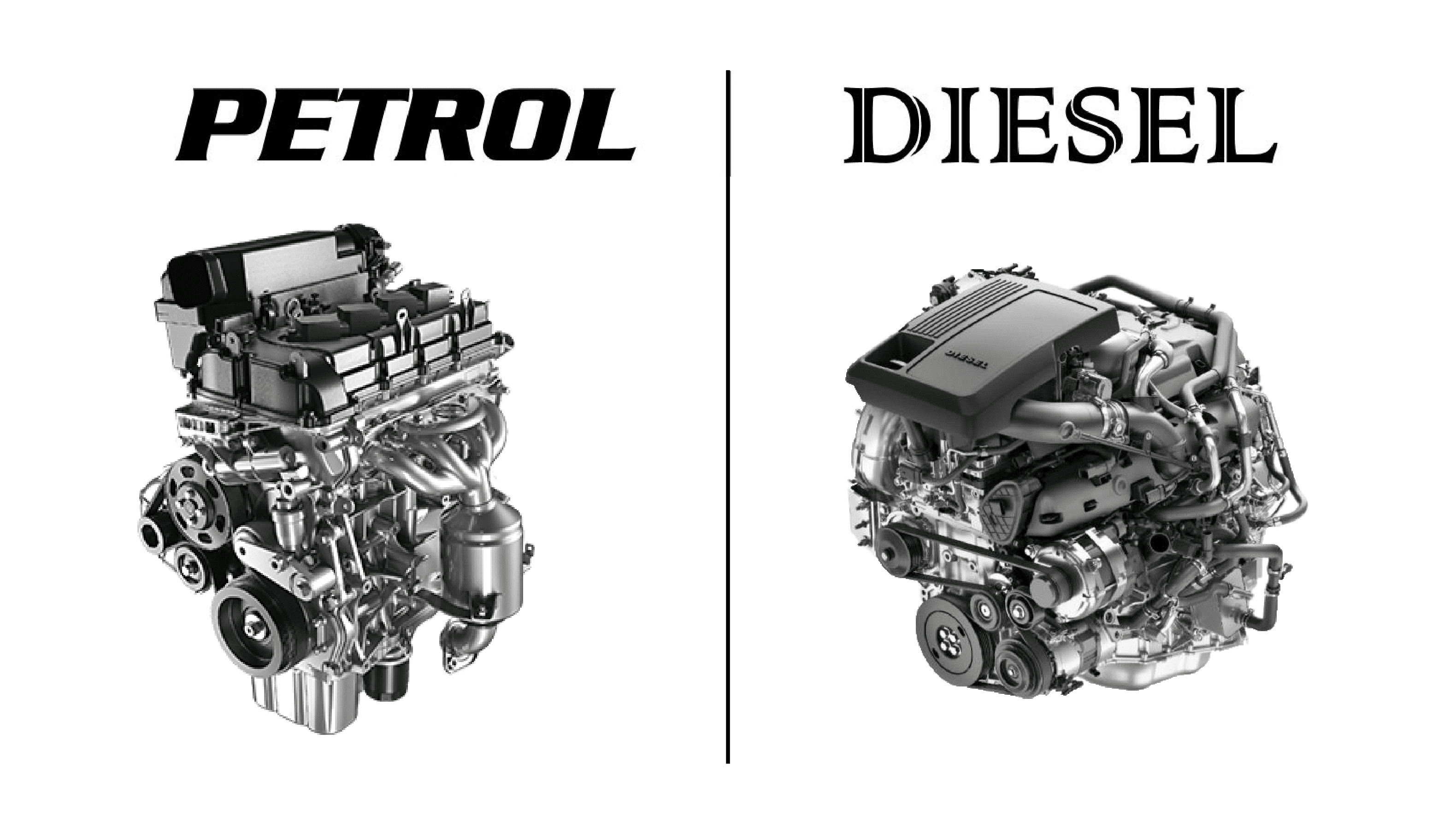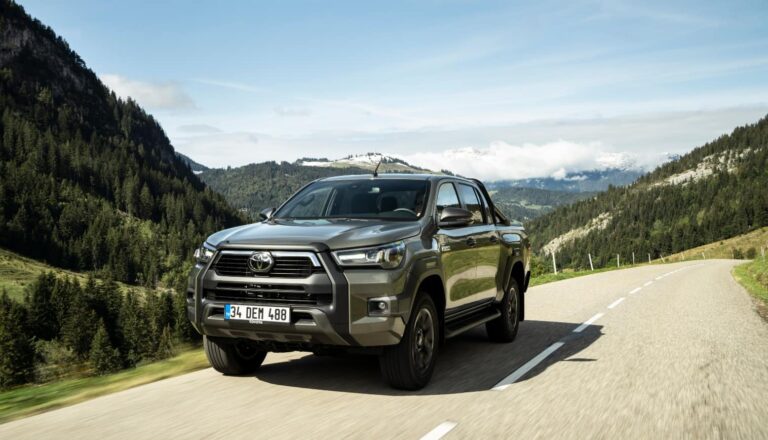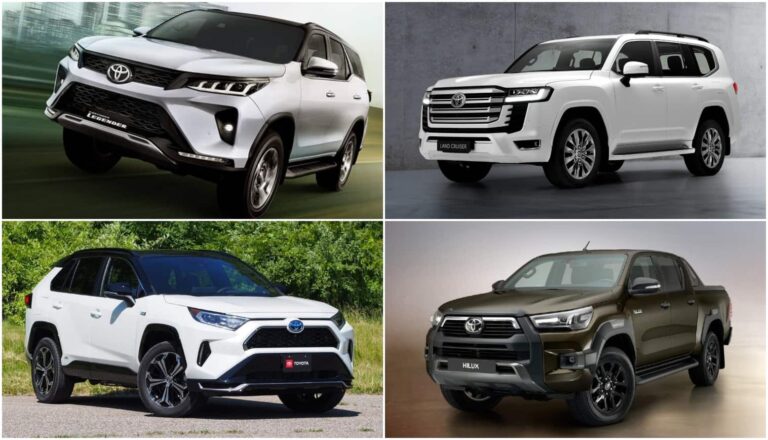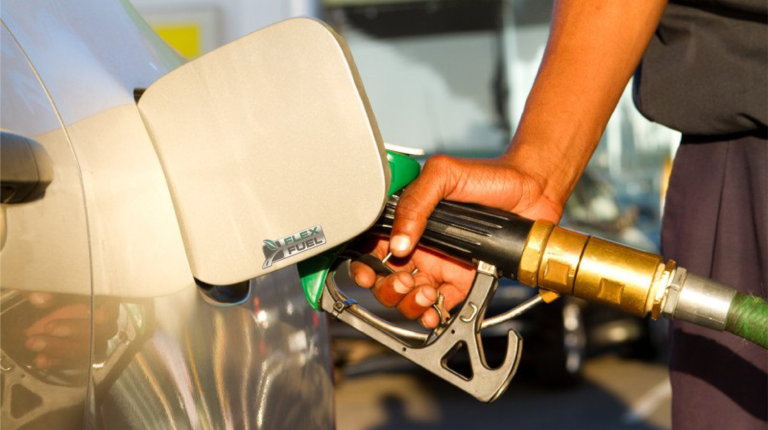
Automotive engines are masterpieces and showcase the progress we have achieved in the space of engineering. Modern automotive engines boast multiple new-age technologies and advancements to keep abreast with stringent emission and testing norms. There are essentially two types of internal combustion engines – petrol/gasoline and diesel engines. However, other fuels like LPG, GNG and flex-fuel are also gaining popularity. While the petrol engines and diesel engines look very similar to each other on the outer shell, there are a ton of differences, pros and cons these two engines have that stand them apart. Let’s see the difference between petrol and diesel engine to understand better.
Difference Between Petrol and Diesel Engine Explained
The most basic difference between a petrol engine and a diesel engine is the combustion process. While petrol engines rely on spark plugs to begin the combustion cycle, diesel engines use compression to complete the combustion cycle. Hence, the petrol engine is also called a spark-ignition (SI) engine whereas a diesel engine is also referred to as a compression ignition engine. If the term combustion cycle is new to you, here is a quick explanation. The combustion cycle refers to the cycle that completes the process of combustion and it includes intake, compression, power and exhaust.
What is a petrol engine?
As the name suggests, an engine that uses petrol to complete the combustion cycle is a petrol engine. It works on the Otto cycle and the name comes from the German engineer Nicolaus Otto who made the first working prototype. A Petrol engine uses spark plugs to ignite the air-fuel mixture and the fuel is mixed with the compressed air before entering into the cylinder. However, new petrol engines now feature direct fuel injection that is more common with turbocharged petrol engines. Petrol engines have a lower compression ratio when compared to diesel engines because of a comparatively smaller stroke. A petrol engine compression ratio ranges from 8:1 to 12:1.
Petrol Engine Advantages
Here are some advantages of a petrol engine over a diesel engine.
- High Revving – Petrol engines always have a much higher RPM when compared to diesel engines. The factor befitting this is the low compression ratio of petrol engines and lighter internals, which let it run more freely. In addition to that, petrol engines have better control over the combustion cycle, thanks to the spark plugs.
- Better Refinement – It is an evident fact that petrol engines are always more refined than diesel engines. They not only have lower NVH levels but they also offer a sportier induction noise at higher RPMs. That’s because petrol is easier to combust and the combustion process is cleaner than that of a diesel engine.
- Low on Maintenance – Petrol engines are always cheaper to maintain than diesel engines unless we are talking big V8 or W16s! That’s largely because of the simpler and less rigorous combustion process. Diesel engines on the other hand work under more pressure and use more complex parts.
- Better Legal Life – In India, petrol-powered cars enjoy a longer 15-year legal life when compared to diesel-powered cars that only have a life of 10 years. It’s because the petrol engines are cleaner whereas diesel engines produce more harmful emissions and soot.
- More Power – Petrol engines produce more power thanks to a larger bore. As the internals of a petrol engine are lighter, they also have a higher RPM limit and better top speed as well. On the flip side, petrol engines produce less torque lower down the rev range.
Also Read: Reasons Why Your Vehicle Could Fail an Emissions Test And How To Get Around It
Petrol Engine Disadvantages
It’s not all rainbow and sunshine, here are some disadvantages of a petrol engine:
- Less Efficient – Petrol engines are inevitably less efficient than diesel engines. And while there are many reasons for that, the sole reason is the lower compression ratio of a petrol engine when compared to diesel engines. The lower compression ratio results in an inefficient combustion cycle and that reduces the overall efficiency. In addition to that, petrol engines run richer when compared to diesel engines with the leaner air-fuel mixture.
- Short-lasting – Petrol engines have a shorter working life and they die earlier than diesel engines. As a matter of fact, petrol engines work at higher RPMs to produce power and that increases the overall wear and tear. On the other hand, diesel engines have better thermal efficiency and they work at lower RPMs.
- Low Torque – Petrol engines always have low torque when compared to diesel engines. Not only the torque output is lower but the torque produced by a petrol engine comes up higher in the rev range. To extract the most out of a petrol engine, you will have to work the gearbox a lot more when compared to a diesel engine.
- Low Thermal Efficiency – Petrol engines have low thermal efficiency when compared to diesel engines. It means petrol engines waste more power in heat when compared to diesel engines. In addition to that, petrol engines are also prone to knocking if worked under pressure and heat, hence that’s compensated with a lower compression ratio.
Also Read: Common Fuel Types Used in Cars in India and How to Select the Right Fuel
What is a Diesel Engine?
The world wouldn’t be a better place to live if we didn’t have diesel engines. All the heavy-duty work couldn’t be handled without what enthusiasts like to call them, torque monsters. Diesel engines are synonyms for torque and as you have already read the pros and cons of petrol engines, let’s get to know about the diesel engines. As it may have become clear to you, a diesel engine runs on diesel and uses compression to combust the fuel, hence also called compression ignition engine.
A diesel engine only compresses air and the residual exhaust gases whereas a petrol engine compresses a mixture of air and fuel. A diesel engine lacks spark plugs or ignition coil and the fuel is sprayed into the cylinder at the very end of the compression stroke. EGR or Exhaust Gas Recirculation is used to increase the thermal efficiency of a diesel engine that is the best among any other internal combustion engine. A diesel engine always runs on a lean air-fuel ratio and that increases the fuel economy. Most modern diesel engines use turbocharging and that offers loads of torque lower down the rev range. A modern diesel engine has compression ratio from 14:1 to 22:1.
Also Read: What are Flex Fuel Engines? Are they good enough for India?
Diesel Engine Advantages
Here are some advantages of a diesel engine:
- High on Efficiency – Diesel engines are always more efficient than their gasoline counterparts. That’s because diesel engines have higher thermal efficiency, higher compression ratio and a lean air-fuel ratio. There are other reasons as well including the properties of the diesel fuel itself.
- Loads of Torque – As we stated earlier, diesel engines are known to offer loads of torque at low RPMs. It becomes very easy to lug around the city and ride with the wave of torque. That’s possible because of the long-stroke of diesel engines.
- High Efficiency – Diesel engines are inherently more efficient than petrol engines. The credit goes to the high compression ratio and thermal efficiency of the diesel engines which increases the efficiency by a fair margin. In addition to that, diesel fuel offers more power in less volume when compared to petrol fuel.
- Long working life – Diesel engines last longer than petrol engines and can bear a lot more load. Diesel engines use heavy internals and they usually operate at low RPMs when compared to petrol engines. Hence, they have a better working life and are capable of bearing more load and abuse.
Also Read: Fuel Economy: Tips to Increase Your Fuel Economy and Save Money
Diesel Engine Disadvantages
With the advent of stringent emission norms and the marginal cost difference between petrol and diesel fuel, diesel engines have lost popularity by a significant margin. Here are some disadvantages of a diesel engine:
- Poor NVH Levels – Noisy, clattery, gravely and gruff. These are the terms you must have heard whilst watching a diesel car review. That’s because it’s not entity possible to eliminate the clattery sound from a diesel engine. A diesel engine burns the fuel by compression and the initial uncontrolled compression is responsible for the noise the engine produces. Some brands use sound deading materials to contain the sound but it couldn’t be completely eliminated.
- Complex and Expensive – Diesel engines are complex to build and owing to the number of parts used, the cost also rises significantly. Moreover, with the stringent emission norms, the cost of the diesel engine has gone even higher. On the other hand, petrol engines are simpler to master and also cheaper to buy in the first place.
- Expensive Emission Control Systems – Thanks to the stringent emission norms, new diesel engines use very complex and expensive emission control systems like DPF, SCR and more. AdBlue adds into the costs of ownership and it becomes a task to keep the equipment up and running. In the long term, if these systems go for a toss, the owner will have to splurge huge money on repairs.
- Hypothetically Cheaper than Petrol Engines – Diesel engines are efficient but you will have to drive them to attain that efficiency. You will only be able to recover the extra cost paid by driving the vehicle for certain kilometres. Keeping a diesel engine low on miles will only give you problems in terms of costs and maintenance.
Also Read: What is an emission control system? Different types and how they work
FAQ:
Q1. The diesel engine runs on which cycle?
Ans. A diesel engine works on the diesel cycle or constant pressure cycle and uses a high degree of compression to ignite the fuel.
Q2. Why diesel engine is more efficient?
Ans. A diesel engine is more efficient because of three reasons: high compression ratio, high thermal efficiency and properties of diesel fuel itself that produce more power with less volume.
Q3. Is diesel engine direct injection?
Ans. All the modern diesel engines feature direct fuel injection along with turbocharging.
Q4. why diesel engines produce more torque?
Ans. Diesel engines have a longer stroke when compared to petrol engines, hence they produce more torque.
Q5. Will the diesel engine run without DEF?
Ans. No, modern diesel engines can not run without DEF. If the DEF tank goes empty, the soot could clog up your DPF and that could result in more severe problems.
So here was an in-depth difference between petrol and diesel engine. Both the engines are great in their respective places and it really boils down to your needs and preferences. Diesel engines are built for heavy-duty purposes and always outperform petrol engines in that regard. However, the high-revving petrol engines are a hoot to drive and that’s why almost all sports cars and supercars make use of petrol engines. You tell us which one would be your pick and why?
If you found this article informative, make sure to check out other interesting reads on the Carorbis Blog and also read Difference Between Manual and Automatic Transmission








